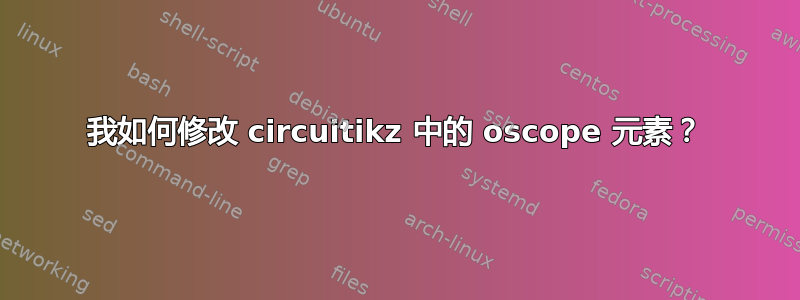
答案1
自 v1.3.5 起,您可以使用一组标准的“预加载”波形作为示波器:
可以通过语法来访问\ctikzset{bipoles/oscope/waveform=name。
如果您想要更多,您可以定义新的形状;有关详细信息,请参阅手册(第 4.6.1.1 节“示波器波形”)但基本上:
\ctikzset{%
bipoles/oscope/waveform/mywave/.code={%
\pgfsetcolor{red}
\pgfpathmoveto{\pgfpoint{-.75cm}{-.5cm}}
\pgfpathlineto{\pgfpoint{.75cm}{.5cm}}
\pgfusepath{draw}
\pgfsetcolor{green}
\pgfpathmoveto{\pgfpoint{-.75cm}{.5cm}}
\pgfpathlineto{\pgfpoint{.75cm}{-.5cm}}
\pgfusepath{draw}
}}
\begin{circuitikz}
\ctikzset{bipoles/oscope/waveform=mywave}
\draw (0,0) node[oscopeshape]{};
\end{circuitikz}
这导致:
1.3.5 之前版本,最好的选择是按照手册中有关添加新双极子的说明进行操作 - 复制旧的,更改名称并重新定义图形元素。除非您对低级 pgf 命令有相当多的实践经验,否则这并不容易......
\documentclass[border=10pt]{standalone}
\usepackage{circuitikz}
\makeatletter
\pgfcircdeclarebipolescaled{instruments}
{
\anchor{in 1}{\southwest\pgf@y=0.75\pgf@y\pgf@x=0.4\pgf@x}
\anchor{in 2}{\southwest\pgf@y=0.75\pgf@y\pgf@x=-0.4\pgf@x}
% put the node text above and centered
\anchor{text}{\pgfextracty{\pgf@circ@res@up}{\northeast}
\pgfpoint{-.5\wd\pgfnodeparttextbox}{
\dimexpr.5\dp\pgfnodeparttextbox+.5\ht\pgfnodeparttextbox+\pgf@circ@res@up\relax
}
}
}
{\ctikzvalof{bipoles/oscope/height}}
{oscopesin}
{\ctikzvalof{bipoles/oscope/height}}
{\ctikzvalof{bipoles/oscope/width}}
{
\pgf@circ@setlinewidth{bipoles}{\pgfstartlinewidth}
\pgfextracty{\pgf@circ@res@up}{\northeast}
\pgfextractx{\pgf@circ@res@right}{\northeast}
\pgfextractx{\pgf@circ@res@left}{\southwest}
\pgfextracty{\pgf@circ@res@down}{\southwest}
\pgfmathsetlength{\pgf@circ@res@step}{0.25*\pgf@circ@res@up}
\pgfscope
\pgfsetcornersarced{\pgfpoint{\pgf@circ@res@step}{\pgf@circ@res@step}}
\pgfpathrectanglecorners{\pgfpoint{\pgf@circ@res@left}{\pgf@circ@res@down}}{\pgfpoint{\pgf@circ@res@right}{\pgf@circ@res@up}}
% this would create a round (analog?) scope...
% \pgfpathellipse{\pgfpointorigin}{\pgfpoint{0}{\pgf@circ@res@up}}{\pgfpoint{\pgf@circ@res@left}{0}}
\pgf@circ@draworfill
\endpgfscope
% get the rotation
\ifpgf@circuit@straightinstruments
\pgfgettransformentries\a\b\temp\temp\temp\temp
\pgfmathsetmacro{\rot}{-atan2(\b,\a)}
\else
\edef\rot{0}
\fi
% and unrotate the scope
\pgfscope
\pgftransformrotate{\rot}
% grid
\pgfscope
\pgfsetlinewidth{0.5\pgfstartlinewidth}
\pgfpathmoveto{\pgfpoint{0.75\pgf@circ@res@left}{0.25\pgf@circ@res@down}}
\pgfpathgrid[stepx=\pgf@circ@res@step, stepy=\pgf@circ@res@step]%
{\pgfpoint{0.75\pgf@circ@res@left}{0.5\pgf@circ@res@down}}
{\pgfpoint{0.75\pgf@circ@res@right}{0.5\pgf@circ@res@up}}
\pgfsetstrokeopacity{0.5}
\pgfusepath{draw}
\endpgfscope
% function displayed
\pgf@circ@setlinewidth{bipoles}{\pgfstartlinewidth}
\pgfpathmoveto{\pgfpoint{0.6\pgf@circ@res@left}{0\pgf@circ@res@down}}
\pgfpathsine{\pgfpoint{-0.3\pgf@circ@res@left}{0.4\pgf@circ@res@up}}
\pgfpathcosine{\pgfpoint{-0.3\pgf@circ@res@left}{-0.4\pgf@circ@res@up}}
\pgfpathsine{\pgfpoint{-0.3\pgf@circ@res@left}{-0.4\pgf@circ@res@up}}
\pgfpathcosine{\pgfpoint{-0.3\pgf@circ@res@left}{0.4\pgf@circ@res@up}}
\pgfusepath{draw}
\endpgfscope
}
\pgfcirc@activate@bipole@simple{l}{oscopesin}
\makeatother
\begin{document}
\begin{tikzpicture}[]
\draw (0,0) node[oscopesinshape]{};
\draw (1,0) to[oscopesin] ++(0,-2);
\end{tikzpicture}
\end{document}






